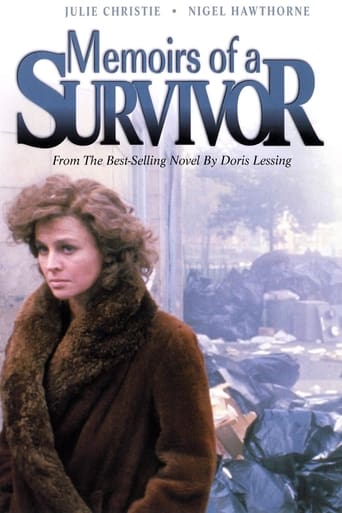

Memoirs of a Survivor (1981)
Based on the acclaimed novel by Doris Lessing, this dystopian science fiction tale concerns a woman struggling to make her way in a post-apocalyptic society. D (Julie Christie) is living in a city that's at the point of collapse following a catastrophic nuclear war; lawlessness and violence rule the day, and gangs of brutal youth roam the streets. With the help of her teenage companion Emily (Leonie Mellinger), D tries to make her way, and in order to cope, she often escapes into a fantasy world in which she lives in genteel Victorian surroundings in the 19th century.
Watch Trailer
Cast
Reviews
Good start, but then it gets ruined
Good concept, poorly executed.
While it doesn't offer any answers, it both thrills and makes you think.
Let me be very fair here, this is not the best movie in my opinion. But, this movie is fun, it has purpose and is very enjoyable to watch.
Not having read the book on which this was based, I found myself wondering quite a lot during the movie: a) I wonder what's going on b) I wonder what this has to do with the plot (if there is a plot) c) I wonder why I rented thisThe soundtrack is very poor and there are moments in the movie when the dialog is unintelligible. Had there just been a little more connection or linkage between the "real" world and the fantasy world, I may have empathized with the character more. As it was, I felt that I was suffering more than "D" - but was grateful my agony would only last two hours.
Mobia and Jon F (above) describe this movie pretty well. It is a deeply 'philosophical' piece, which sounds an awfully elitist thing to say I know, but it is a movie that demands a reflection upon what it means to be human and the sorts of relationships that bind humans together. It may also be called 'psychological' in that it examines intra-psychic conflicts as well - particularly from the female perspective (which I am not) and that is powerful. It is based in an era of social decay and reminded me of Hobbes where life is "nasty, brutish and short", where humans have been reduced to animals, where the bonds of humanity have been stretched. Is this what we are to become? Is this what we really are? I loved it. It haunted me. I became a Doris Lessing fan after this and have just finished the book. No exploding cars for those that love that sort of thing.
The sets, lighting design and foreboding music score all match the gloominess of the material here well, and the atmosphere that these combined elements achieve is what keeps the film relatively intriguing. The first third definitely works better than the final third of the film though, as in the beginning one is trying to decipher what it is all about, and towards the end it just drags, and it looks like it is building up to some revelation, yet at the end nothing new is revealed. The plot is really strange, with many different elements of science fiction worked in, ranging from portholes to the notion of a dire dystopia. It seems somewhat messy, but even so, some have been able to find their own meanings in it, so the film is probably worth a look if it sounds interesting. I would not call it a brilliant film myself, but it definitely does have some elements that will be of interest to certain viewers.
I found the film immensely interesting. You see the decay of urbanity from the eyes of a woman ('D') hiding in her bastion of civilisation, a council flat. Her impregnable retreat is suddenly breached by the intrusion of two factors, the imposition on her by an unnamed authority of an orphan called Emily, and her sudden realisation that beyond the wall lies the past? the future? or perhaps an alternative world told through the various incarnations of a house she visits as an unseen entity.While the brutalised orphans of the streets outside seem to be beginning to supplant the authorities and are accelerating the end of the world. D realises through her wall, that the condition of her society is not new. Society grows from strict disciplinarian routes, and when achieved embarks on a decaying relaxation of morals which inevitably ends in the collapse of society. Those that are necessary to rebuild society are not necessarily nice people, merely essential, thus we arrive at the Gerald character. Eventually Emily and Gerald rescue the savage (troglodyte) children of the subways, and with the help of D and the wall, take them to a new Eden, where the children will be able to begin a new society starting from caveman.It is obvious because of the cannibalistic nature of the children that Gerald, Emily and D will not survive this process, but their action is essential to build anew, and the children will begin without the memory of their former civilisation's decay. Thus we are brought from the end of the world, to the beginning of a new world for the orphans of the old. Most people believed that the collapse of D's world was a prediction of the collapse of our own, but perhaps our world is actually the one behind the wall. That is up to you.This is an intensely moving novel produced by a woman of feeling who had witnessed the brutalisation and savagery of war at close hand and understood the nature of the fall of society. Not an action film, but a masterpiece that many will not understand because of its intensely philosophical nature.


